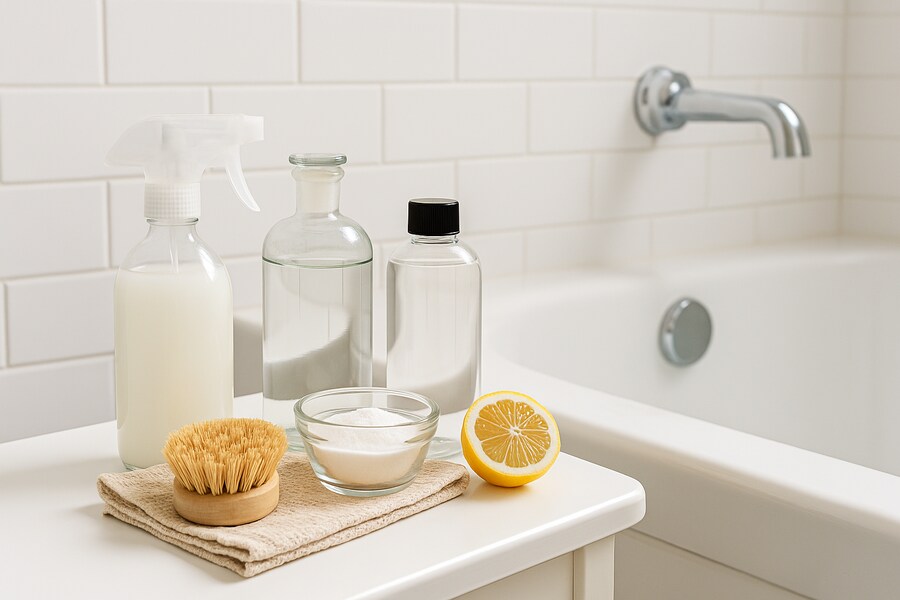Top Natural Cleaning Products for Various Surfaces in Bathrooms
Are you fed up with the acrid scent of cleaning agents pervading your bathroom after each clean-up? It is not only you! Instead, everyone switched to natural cleaning products for a greener environment and to keep their homes healthier. Nature provides truly powerful, yet safe ingredients that clean the same grunge, soap scum, and mildew as synthetic cleaners.
But there is also something else to consider: not every surface is the same. What works wonders on your tiles might just destroy your glass or streak your mirror. Therefore, we have put together the best natural bathroom cleaning products for all surfaces-from sinks and tubs to mirrors and toilets. So read on to find out how to clean in the Darwin way-your bathroom!
1. White Vinegar: For Bathing, Glass, and Mirror
Due to its extreme acidity, white vinegar is considered one of the greatest Bond Cleaning in Perth cleaning agents one can lay their hands on for a bath. It is effective against soap scum, hard water stains, rust, dirt, and everything else filthy from showerheads, glass doors, and mirrors-soft in acid- this pretty much dislodges all grime buildup that may have latched onto delicate glass surfaces with no major marks or streaks.
However, if you desire to clean the shower, mix equal amounts of vinegar and warm water in a bucket. Place the showerhead in the solution and leave it for about an hour, preferably overnight. Next, scrub and rinse off the showerhead. While for cleaning glass and mirrors, place warm water and some drops of dish soap in a spray bottle, spray the surface with that mixture, and squeegee off the soap and water.
Tip: White vinegar will also kill mould or mildew wherever on these surfaces.
2. Baking Soda: For Bathtubs, Tiles, and Grout Lines
With a mild abrasive nature, baking soda works best for the gentle scrubbing of bathroom surfaces. It spares especially delicate natural stone bathtubs, tiles, and grout lines from damage while cleaning. In this way, it cleans grease stains, grime, foul odour, and soap scum with incredible efficiency.
Make a thick paste and apply it with a brush on the tub, tiles, and white lines. With gentle circular movements, scrub to combat stains, and leave for a few minutes before rinsing for a shinier finish.
Tip: Use an old toothbrush for grout lines. It will help you get into those areas and scrub the stains out.
3. Hydrogen peroxide for dirty toilets and mouldy kitchens
A magical potion on the road from inspection would be hydrogen peroxide. The 3% hydrogen peroxide goes in the spray bottle and is sprayed on surfaces affected by mildew and on toilets. Leave on for 10 to 15 minutes. Hydrogen peroxide works to oxidise and break down the mould spores and pushes through rust stains on the surface. Work in with a soft-bristled brush or a toilet brush (for toilet bowls) in gentle motions. Once clean, rinse down the walls and tiles, then dry. This helps prevent regrowth.
For toilets, swish around some vinegar after flushing, allowing it to sit 10 minutes to lift any grime and grease that remains. If vacating a rental within a few weeks, keep cleaning your bathroom fixtures, and consider booking an affordable bond cleaning service early for a smooth rental inspection. For official guidance, refer to the South Australian Government’s residential bonds advice to ensure you’re aligned with the required procedures.
4. Castile Soap: Sinks, Counters and Floors
This is a plant-based soap free from chemicals, which means it can remove stains and grime from various surfaces. It does not have fragrance chemicals that might aggravate people with allergies and asthma conditions. This makes it less useful for surfaces like stainless steel, delicate countertops and floors, which could cause them damage. Here goes a quick recipe:
- 1/4 cup Castile soap mixed with one part warm water,
- 1 teaspoon dishwashing liquid soap,
- A few drops of their favourite essential oil.
- Remain calm while cleaning their surfaces like a pro.
5. Rubbing Alcohol: For High Touch Surfaces like Faucets and Knobs
Instead of using commercial disinfectants in sprays or wipes, spray rubbing alcohol on the hard touch surfaces of your bathrooms and get rid of all traces of invading bacteria in accumulating with breaking down those mineral deposits. Spraying is good for taps, sinks, doorknobs, and other contaminated surfaces. Wait a few minutes or until you wipe off with a clean cloth. You can repeat it to keep dangerous germs such as E. coli at ba,y therefore.
6. A mixture of vinegar and baking Soda: Unclogs the Drains
Make use of these two products to clean up like a natural cleaner. Pour a cup of baking soda down your drain. Wait a few minutes before pouring down a cup of white vinegar; the carbon dioxide will be generated. Put on the lid and let it sit for 30 minutes; it will get rid of the grease and stuck grime. Finally, pour hot water from a bucket down the drain to help clear it. Also, goodbye bad smells.
Tip: Of course, this advice on bond cleaning from most cleaners uses essential oils such as tea tree, lemon, and lavender to obtain a higher level of cleaning standard that goes very well with seamlessly passing rental inspections.
Conclusion
Cleanliness is not synonymous with using harsh chemicals in your bathroom. With the right natural products for all the surfaces, you can enjoy a clean and fresh space that is safe for family and gentle to the environment. Nature has provided some answers to problems, from using vinegar to clean glass to using baking soda for the tub! Time to grab the green-every breath will feel good; every penny will make sense; and with no compromise on the outcome, you will have a naturally shiny bathroom!
Also learn about What to Expect From an Expert Cleaning Service?


